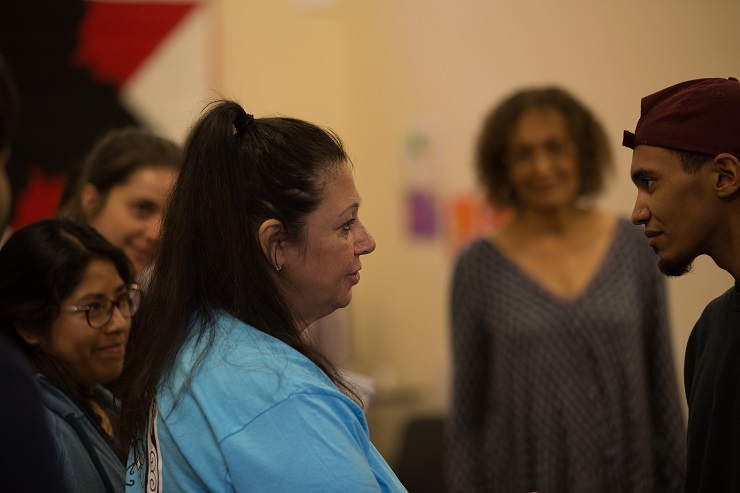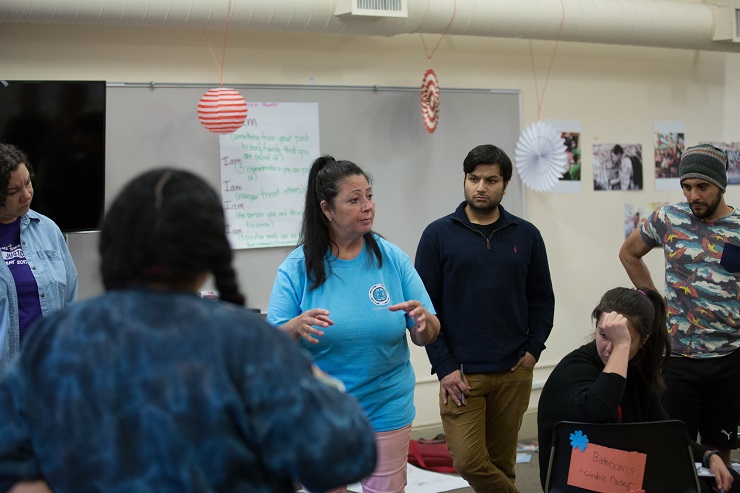
2017 Youth Program Training Don Davis / AFSC
On November 16th I had the privilege of getting to talk with Denise Altvater, coordinator of the Wabanaki Youth Program in Maine. She had a lot to offer in ourconversation that covered the importance of decolonization, anti-racism, faith, truth-telling, the impacts of colonization among those who were victim to it and those who were perpetrators, and a lot more. We posted the conversation as a series of 5 blog posts. All of the posts are worth reading in their entirety, but here is a recap and guide to that conversation with links to each post. - Christina

1. Thinking about decolonization as Thanksgiving approaches: A conversation with Denise Altvater part 1: Colonization has been built into America’s infrastructure since 1492. Denise recognizes that decolonization practices coupled with anti-racism work can only be successful if practiced together and daily. If we want to commit to healing and liberating ourselves, decolonization isn’t something that we should only be thinking about during holidays like Thanksgiving or Columbus Day. Daily and conscious practices are how we can resist and break through the very real blockages that colonization in the self and in the system presents.
2. Decolonizing our hearts and minds as people of faith: A conversation with Denise Altvater, part 2: There is a real disconnect with the early colonization of the land called the United States that actually took place and with what people of faith teach. There are many myths that uphold colonial mindsets. It is possible to bridge that gap with videos, presentations, handouts, and workshops that focus on truth-telling. Thought-provoking practices that counter the dominant narrative have proven to open up the hearts and minds of people of faith, awakening them not only to the impacts of colonization on indigenous people, but, as a result, on the settlers, too. This is a progressive next step to getting decolonized: talking and acknowledging the truth of the past – to accept the truth of the present.
3. Healing does not require forgiveness: A conversation with Denise Altvater, part 3: Healing from colonization is possible, and forgiveness doesn’t have to be in the equation in order to attain it. Without healing from the genocide, theft, abuse and victimization of those oppressed, these wounds of trauma gets passed down to children and grandchildren and festers in our dearest relationships. Truth-telling needs to happen to open up the valve for healing. The process of healing will enable us to not just speak the truth of our past, but to listen to it, learn from it, share it and practice actively in the act of decolonization. In order to heal, oppressed people are not required to forgive those who oppress them.
4. Colonialism and late stage genocide: A conversation with Denise Altvater, part 4: The aftermath of colonization has ongoing ripple effects in indigenous communities, on the reservations, in people’s communities, and within their hearts and minds. It can leave both the perpetrator and the victim stripped of their humanity and left with feelings of self-hatred (or self-aggrandizement). The genocide of indigenous people still persists in the form of inadequate health care, high poverty rates, and in many other ways. The disconnect that people feel from the earth and thus themselves keeps them from acknowledging both their humanity and their victimhood in colonization to take the next step towards decolonization.
5. Acknowledging the full truth of our past: A conversation with Denise Altvater, part 5: The history of the past is connected to colonization and its current impact that still takes a toll on each of us now. Actively facing the truth of colonization and how it still benefits privileged members of society at the expense of marginalized communities, acknowledging this truth, and taking accountability permits us to move forward toward decolonization. If we start on the path to respecting and taking care of planet earth and one another, then the nature of our relationship with ourselves and with each other will change.
Related posts